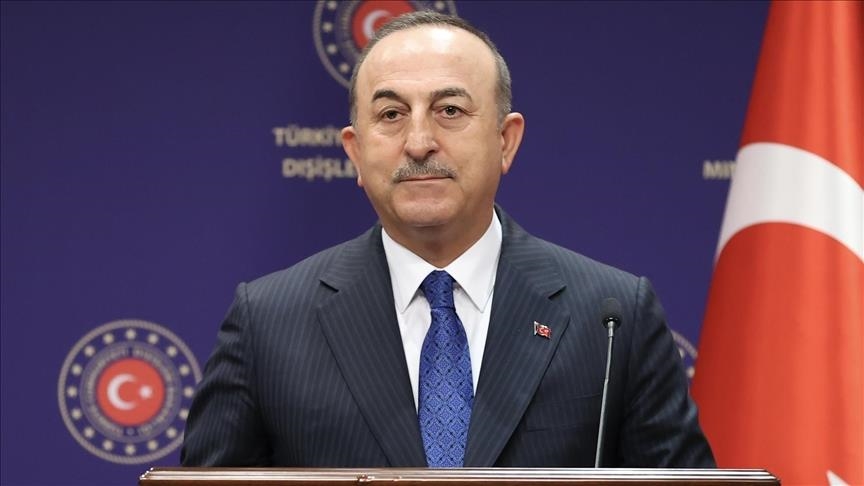Turkiye on Tuesday criticized a Swedish far-right politician for burning the Muslim holy book Quran, saying that such “neo-Nazi movements have led to increased Islamophobia.”
Urging collaboration against any form of racism and Islamophobic rhetoric, Turkish Foreign Minister Mevlut Cavusoglu told a joint press conference in the capital Ankara with his Hungarian counterpart Peter Szijjarto that attacks on mosques and the burning of the Quran have nothing to do with freedom of expression.
On Thursday, Rasmus Paludan, the leader of Sweden’s far-right Stram Kurs (Hard Line) group, burned a copy of the holy Quran in the southern city of Linkoping.
Three people were injured Sunday in the eastern city of Norrkoping when police reportedly fired on rioters during protests against the burning of the Quran.
Rise in Islamophobic attacks
Noting that racist and Islamophobic attacks rose during the Muslim holy month of Ramadan, Cavusoglu said the incident in Sweden took place “under police supervision.”
He also cited other racist attacks happening in other parts of the world, saying that a Turkish citizen faced a racist attack in New York on April 15, while a Turkish mosque in Dortmund, Germany got threatening letters with photos of pigs on April 16.
Cavusoglu also decried attacks on Palestinians in the West Bank and at Jerusalem’s Al-Aqsa Mosque, saying at least 18 people have died so far and over 400 were injured.
“We think that this rise during Ramadan is no coincidence. Especially in the West, we see that neo-Nazi movements, including political parties, stepped up racist and anti-Islamic attacks,” he added.
“Anti-Christianity, anti-Semitism, and Islamophobia are crimes against humanity,” he said.
Turkish President Recep Tayyip Erdogan on Tuesday will hold a phone conversation with his Israeli counterpart Isaac Herzog on the ongoing incidents in the West Bank and at Jerusalem’s Al-Aqsa Mosque, he said.
On Russia’s war on Ukraine, Cavusoglu said: “We believe that a solution can only be achieved through diplomatic means. We believe that there will be no military solution.”
Saying that Turkiye continues its high-level dialogues and discussions with Russian and Ukrainian delegations, Cavusoglu said: “We are of course seeing the start of a new cold war … It may take 10 years for trust to be established, but we think that quick steps on a cease-fire and certain issues need to be taken.”
For his part, the Hungarian foreign minister welcomed Turkiye’s efforts for peace and an end to the Russia-Ukraine war.
Szijjarto reaffirmed his country’s support for Ukraine’s territorial integrity and sovereignty, saying that Hungary “cannot pay the price for the war.”
Hundreds of thousands of Ukrainian refugees have sought refuge in Hungary.
“We will not support sanctions on Russian oil and gas,” he said, adding that Russian gas shipments to Hungary are arriving without any disruptions.
At least 2,072 civilians have been killed and 2,818 injured in Ukraine so far in the war that started on Feb. 24, according to UN estimates, with the true figure believed to be much higher.
More than 4.9 million Ukrainians have fled to other countries, with over 7 million more internally displaced, said the UN refugee agency.
Bilateral relations, trade
Earlier, Cavusoglu also attended a groundbreaking ceremony for the new Hungarian Embassy building in Ankara.
“The (Turkish) Embassy residence in (Budapest) Hungary, which was built in the first years of our republic, has been serving our relations for nearly a century. Hopefully, the new buildings that we will lay the foundations for will strengthen our relations for the next century,” said Cavusoglu at the ceremony.
Relations between the two countries have strengthened in recent years, said Cavusoglu, adding that 2024 has been declared the Hungarian-Turkish Year of Culture.
Turkiye’s top diplomat also praised Hungary’s contributions to the Organization of Turkic States as an observer.
“Our bilateral trade volume continued to rise in 2021, up 11% to $3 billion,” said Cavusoglu, adding that the target is $6 billion.
Szijjarto, for his part, said that recent developments and the Ukraine war have shown “the value of everything that brings stability and predictability.”
“The cooperation and strategic partnership between Hungary and Turkiye is such a predictable relationship … The development of cooperation is always in the focus of Hungarian foreign policy and I can assure you so it will remain,” he said.






